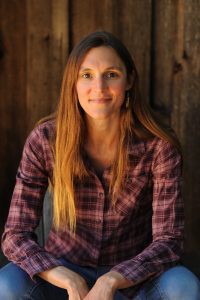
Liz Carlisle‘s new book, Healing Grounds: Climate, Justice, and the Deep Roots of Regenerative Farming, is a fascinating exploration of food, agriculture, and cultural traditions of the North American, Mesoamerican, African, and Asian diasporas that have survived against all odds in the United States. Despite brutal social and political oppression, these communities have preserved soil-friendly polyculture techniques and cultural practices, like reciprocity and community participation, which point toward more sustainable and regenerative ways of producing food and of living with one another.
Liz Carlisle is an author and agroecologist and is Assistant Professor in the Environmental Studies Program at UC Santa Barbara, where she teaches courses on food and farming. Her previous books are Grain by Grain and Lentil Underground. She also spent several years touring rural America as a country singer.
Cover art by Patricia Wakida
4’24 the question of how to sequester carbon evolved into a bigger question about shifting our society’s relationship to land––and looking at how other cultures do this
7’37 bringing the buffalo “relatives” home
8’47 how buffalo co-evolved with and shaped the prairie
9’59 bringing buffalo home is part of revitalizing culture
10’53 differences between buffalo and cattle on the land
11’32 buffalo as teachers
12’24 cultural and social norms are part of regeneration
12’16 Blackfeet nation treaty about the buffalo from the native perspective
17’38 differences between managing buffalo as domesticated animals and wild animals
21’31 Olivia Watkins building on the legacy of African farming and agroforestry
22’08 Harriet Tubman, George Washington Carver
23’21 Watkins exposed to agroforestry in Hawaii
24’30 went to Soul Fire Farm in upstate NY
26’11 made her family land a sanctuary space for black people and wildlife
26’49 president of Black Farmer Fund
27’28 the difference between natural forests and tree plantations
29’23 seeing trees––or people––as part of an interconnected community rather than an individual
30’02 “if you want to go fast, go alone; if you want to go far, go together” African proverb
31’48 the broken promise of “forty acres and a mule”
34’26 Aidee Guzman and the biodiverse farms of California’s central valley
34’20 traditions of polyculture farms from both Mexico/Central America and southeast Asia
36’14 polyculture farms had healthier soil
37’16 the immigrant communities are restoring this very degraded place with their own traditions from their home countries
38’12 how the “three sisters”––corn, squash, and beans––polyculture works and how it evolved and spread across the continent
41’12 even specialized squash bees prefer the polyculture squash to monoculture squash farms
42’48 looking to cultures that don’t separate the different stages of food production––growing, harvesting, preparing, eating
43’34 the book Zapotec Science
44’48 no waste in these food systems, everything was recycled because everyone was participating
46’01 monoculture seems to go hand in hand with exploitive labor, while regenerative ag seems to make a fairer and more enjoyable food system possible
47’41 Braiding Sweetgrass book and creation stories
49’01 monoculture makes sense only as an extractive industry to make money and enforce hierarchy
50’19 imagining a food system that people want their kids to stay in
52’06 the organic movement started actually in India––see Sir Albert Howard’s book, The Soil and Health and the “law of return”
52’42 Franklin Hiram King who also observed and wrote about farming in the far east in his book Farmers of Forty Centuries
54’17 20th century law barred Asian people from working on or owning land, even as the organic movement is embracing their organic techniques
56’03 the importance of continuity and stability for building soil
58’04 reframing the idea of “waste”
1:00’13 moving away from extraction and toward reciprocity in agriculture
1:00’42 the importance of getting involved in the farm bill and making it more regenerative, and lots of other ways to create alternative food systems



Subscribe:
Apple Podcasts
Spotify